TL;DR – Vet Recommended Dog Teeth Cleaning Guide
- Oral health = overall health: Poor dental care can lead to pain, infections, and serious organ damage.
- Watch for signs: Bad breath, tartar, red gums, and loose teeth indicate dental problems.
- Vet care matters: Annual or biannual cleanings by a veterinarian are essential for deep cleaning and early disease detection.
- Daily home care: Brush your dog’s teeth daily using dog-specific toothpaste and soft-bristled brushes or wipes.
- Dental treats & diets: Use VOHC-approved chews and kibble formulated to reduce plaque and tartar.
- Bad breath alert: Persistent odour could signal periodontal disease or other health issues. See your vet.
- Know when to visit the vet: If you notice bleeding gums, discoloration, or broken teeth, seek professional care.
Book your dog’s dental checkup today and give them the clean, healthy smile they deserve!
Is your dog's smile as healthy as it looks? Many pet parents overlook the importance of regular dental care, until bad breath, gum disease, or even tooth loss sets in. Just like us, dogs need consistent oral hygiene to stay healthy and pain-free, yet their dental needs are often misunderstood or delayed.
From choosing the right toothbrush to knowing when professional cleanings are necessary, this guide offers vet-approved tips and affordable solutions to keep your dog’s teeth clean and their mouth in top shape. You’ll learn the basics of dog dental care, signs of oral health problems, vet-recommended teeth cleaning tips, and practical ways to protect your pet’s smile.
Understanding Your Pet's Oral Health
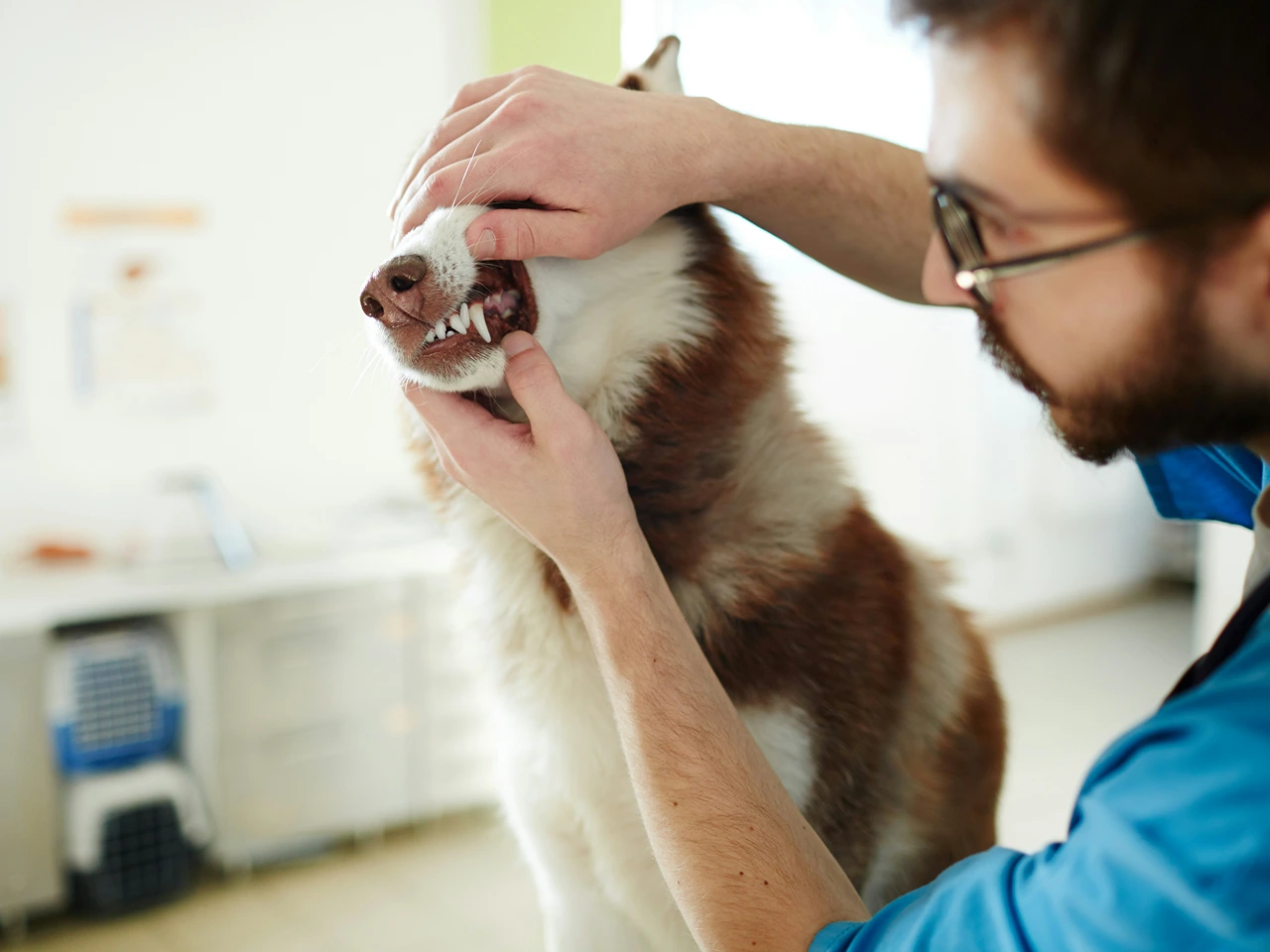
A healthy mouth isn’t just about a nice smile, it helps your pet avoid pain, stay comfortable, and steer clear of serious health issues. Knowing the basics of your dog’s teeth and gums is the first step to giving them the oral health care they need.
Signs of Healthy vs. Unhealthy Dog Gums and Teeth
When your dog's teeth are in good shape, they’re usually bright white with pink, firm gums, and there’s no bad smell coming from their mouth. But spotting the signs of dental trouble early can save your dog from a lot of discomfort. Look out for:
- Red or bleeding gums: This can be one of the first signs of gum disease.
- Brownish-yellow plaque and tartar: That build-up isn’t just ugly; it’s harmful.
- Loose or broken teeth: Often a sign of a deeper condition in dogs that needs attention.
- Bad breath that won’t quit: Not just annoying, it could mean infection.
- Trouble eating or chewing: If your dog’s avoiding food or chewing on one side, something’s up.
These symptoms can point to dental disease, which doesn’t just affect your dog’s oral health, it can let bacteria slip into the bloodstream and mess with important organs like the heart, kidneys, or liver. That’s why brushing your pet’s teeth every day really makes a difference.
Risk Factors That Make Certain Pets More Vulnerable
Some dogs are just more likely to run into dental problems than others. Small breeds, toy dogs, and older pups tend to build up plaque faster, and here’s why:
- Tight or crowded teeth leave more hiding spots for food and bacteria.
- No regular brushing? That’s a fast track to dental disease.
- Certain breeds, like Chihuahuas, Dachshunds, and Greyhounds, are more prone to mouth issues by nature.
- Skipping dental care when they’re young makes things worse as they grow older.
Starting simple habits like brushing your pet’s teeth and scheduling regular checkups can go a long way. Protecting your dog’s oral health doesn’t have to be complicated, it just has to be consistent.
The Role of Vets in Maintaining Pet Dental Health
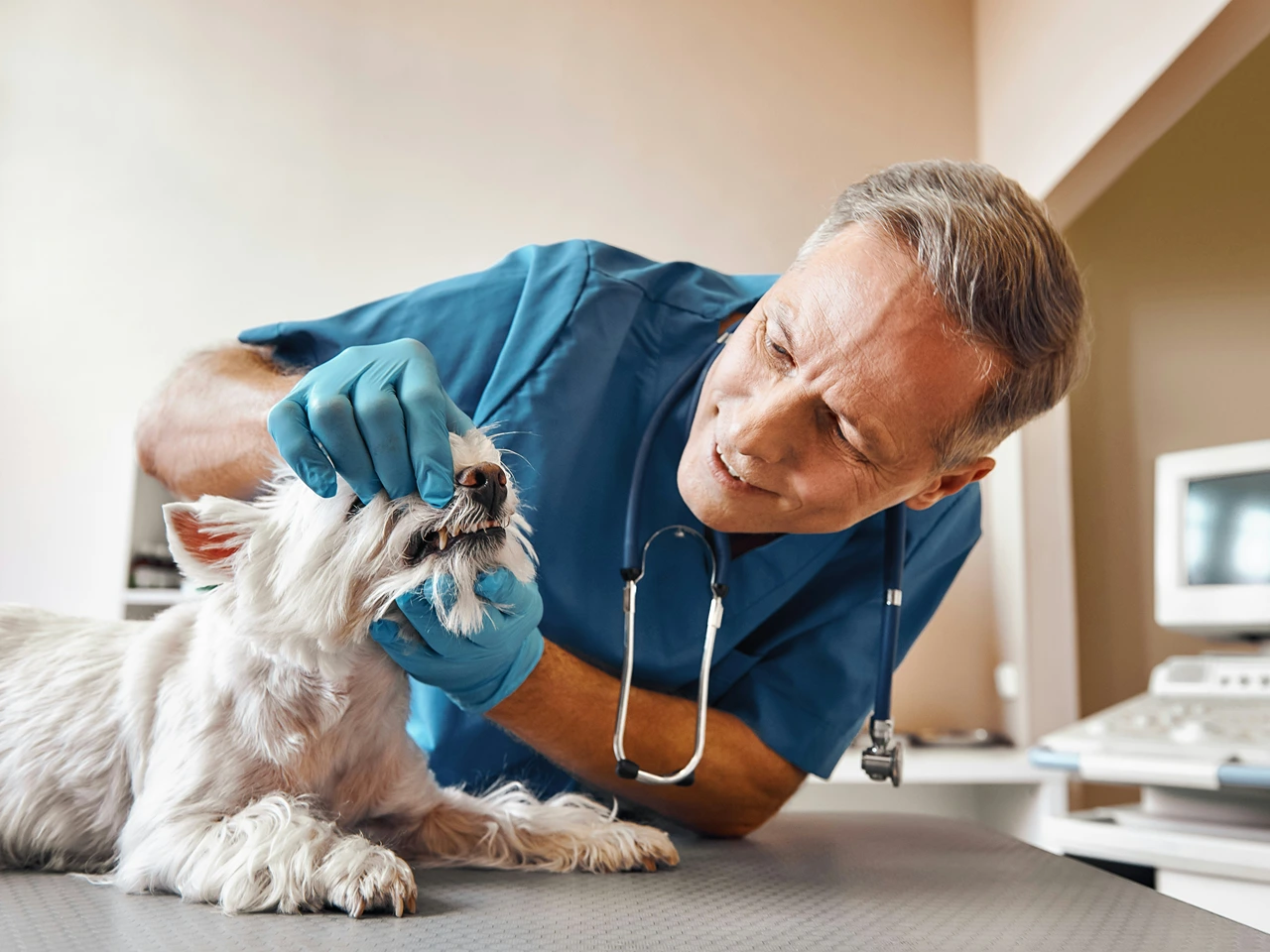
Brushing at home helps, but nothing beats a professional cleaning done by a board-certified veterinary dentist. They’ve got the experience, tools, and trained eye to spot problems early, way before they become expensive or painful for your pup. Regular dental check-ups are the secret to staying ahead of serious issues.
Depending on your dog’s age and breed, your vet might recommend a professional cleaning at least once a year, or even every six months if they’re more prone to dental issues.
What’s Included in Professional Dental Care
When you book dental care with your vet, it’s more than a simple brushing. Affordable veterinary dental care often includes a few key options:
- Basic clean and polish packages: Great for removing surface stains and freshening breath.
- Sedated dental exams with X-rays: These allow for a pain-free and thorough look inside your dog’s mouth.
- Tooth extractions, if needed: Sometimes the best way to stop pain or infection is to remove a problem tooth.
With a little help from your veterinary dentist, your dog’s teeth can stay strong, clean, and pain-free for years to come. Staying consistent with dental check-ups makes all the difference.
Vet Recommended Dog Teeth Cleaning & Oral Care Tips
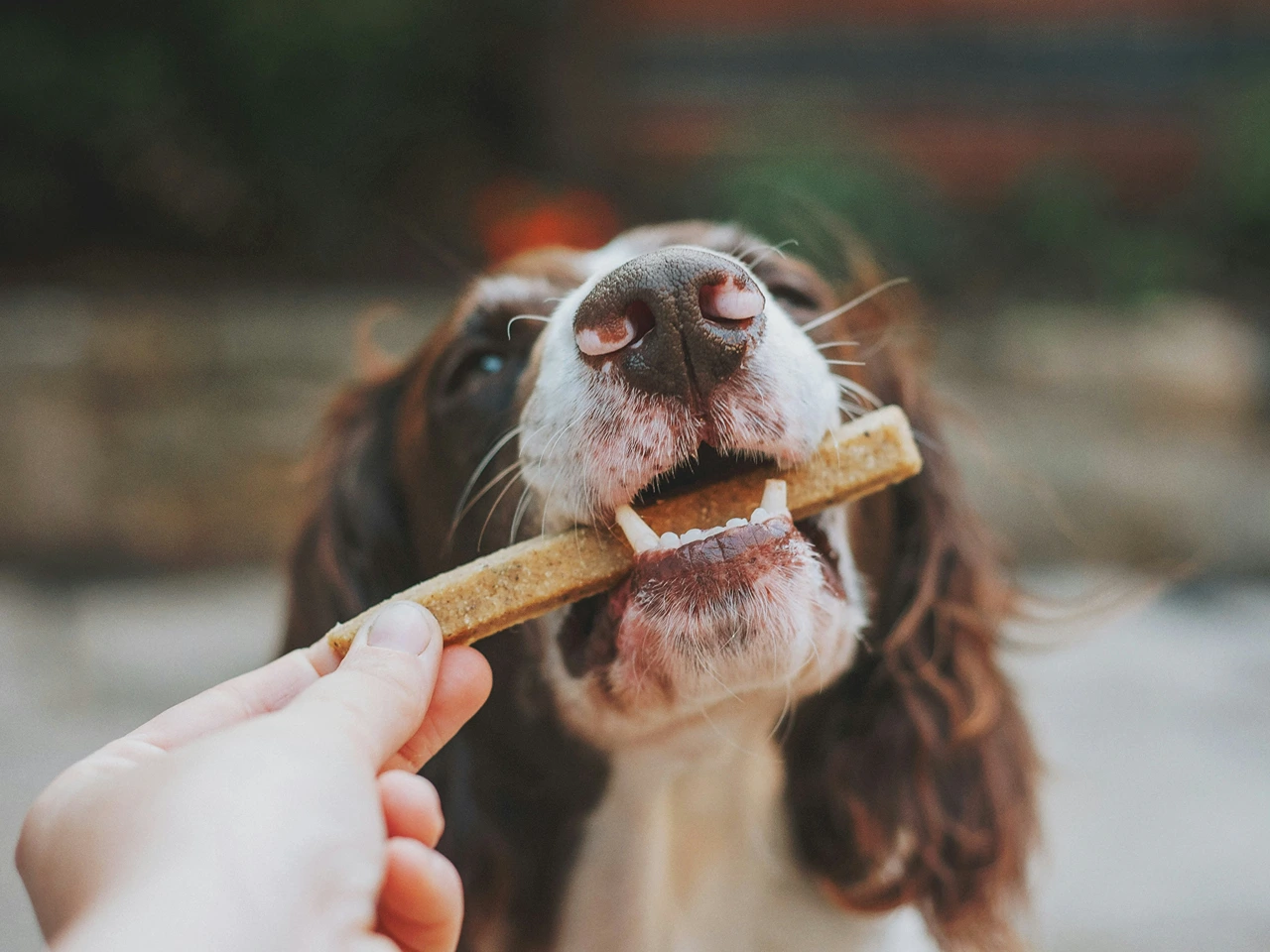
Keeping your dog’s mouth healthy doesn’t have to be complicated. With the right mix of products and habits, you can support good dental hygiene at home, especially if your pup isn’t a fan of brushing.
1. Dental Treats and Chews
Veterinary dental diets use larger kibbles with special texture and shape to clean dogs' teeth as they chew. Some include added enzymes or agents that reduce plaque and tartar buildup. Look for dental products approved by the Veterinary Oral Health Council (VOHC).
- Dental chews are perfect for dogs who won’t tolerate brushing. Limit to one dental chew per day to avoid overfeeding and maximize dental hygiene benefits.
- Natural chews like rawhide or bully sticks may clean teeth mechanically, but lack the formulation of VOHC-approved dental chews. Choose wisely for better cleaning and safety.
Oral Care Tips
- Choose VOHC-approved treats, chews, and diets whenever possible to ensure you're using products that actually work.
- Combine daily brushing with chews for the best results. Chews can’t replace brushing entirely, but they’re a great support tool.
- Introduce new products gradually to help your dog adjust without resistance or stress.
- Use a water additive for a hassle-free way to freshen breath and support dental health in between brushings.
2. Brushing Basics: Oral Hygiene Routines
Even if you’re scheduling vet visits, you still need to take care of your dog’s teeth at home. Daily brushing is your best defence against buildup, professional cleanings help, but they can’t replace consistent at-home care.
- Choose the Right Toothbrush for Your Dog’s Size: Pick a dog toothbrush that fits your pup’s mouth comfortably. For smaller breeds, a finger brush gives you better control and is less intimidating. Larger dogs usually do better with angled brushes that reach the back teeth more easily.
- Vet-Approved Dog-Safe Toothpaste: Never use your own toothpaste, toothpaste made specifically for dogs is a must. It’s safe to swallow and often contains enzymes or gentle abrasives that break down plaque and freshen breath.
Step-by-Step Brushing Technique for Pet Owners
- Let your dog taste the toothpaste: Give them a small sample so they know it’s safe and yummy.
- Gently lift the lips: Start slow and keep things relaxed to avoid making your dog anxious.
- Use circular motions at the gumline: This helps remove plaque where it builds up the most.
- Focus on the outer surfaces: These areas are the most prone to tartar since your dog’s tongue doesn’t clean them naturally.
- Praise and reward!: End every brushing session on a positive note with treats, belly rubs, or playtime.
With the right tools and a little patience, brushing can become a bonding ritual, and a key part of your dog’s daily oral hygiene routine.
3. Dental Wipes for Dogs
If your dog runs at the sight of a toothbrush, dental wipes can be a great way to clean their teeth without the stress. They’re gentle, easy to use, and a solid option for pups who won’t sit still for brushing.
- Not all dental wipes for dogs are created equal. Check the label for ingredients like chlorhexidine, enzymes, or essential oils. These help kill bacteria, freshen breath, and keep their teeth clean between brushings or professional care.
- To avoid gum irritation, simply wrap a dental wipe around your finger and gently rub along the teeth and gumline. One swipe per day is usually enough to support good oral hygiene without overwhelming your pup.
Wipes vs. Sprays vs. Gels: What Works Best for Your Lifestyle
- Wipes are quick, mess-free, and easy to control, great for busy pet parents or skittish dogs.
- Gels tend to stick better to problem areas, offering more targeted cleaning if your dog tolerates them.
- Sprays are handy for freshening breath, but they don’t physically remove debris like wipes do.
Choose what fits your routine, but when in doubt, wipes are a solid starting point for home dental care.
4. Dental Checkups and Professional Cleanings
While home care matters, vet visits are just as important. Routine exams help prevent dental disease from sneaking up on you and causing long-term damage.
- Schedule Annual or Biannual Dental Exams: Depending on your dog’s age, breed, and dental history, your vet may recommend cleanings once or twice a year. These visits catch issues early, before they get painful or pricey.
- Professional Cleanings: Unlike home tools, vets use ultrasonic scalers and other instruments to clean deep under the gums, places plaque hides and builds up.
- Dental X-Rays: X-rays give a full picture of your dog’s oral health, including root infections, bone loss, or hidden decay that you simply can’t see without advanced tools.
- Vets Can Detect Early Signs of Periodontal Disease or Infections: Redness, swelling, loose teeth, these can all be early red flags. Vets are trained to spot the subtle changes that often go unnoticed at home.
Dealing With Bad Breath the Right Way
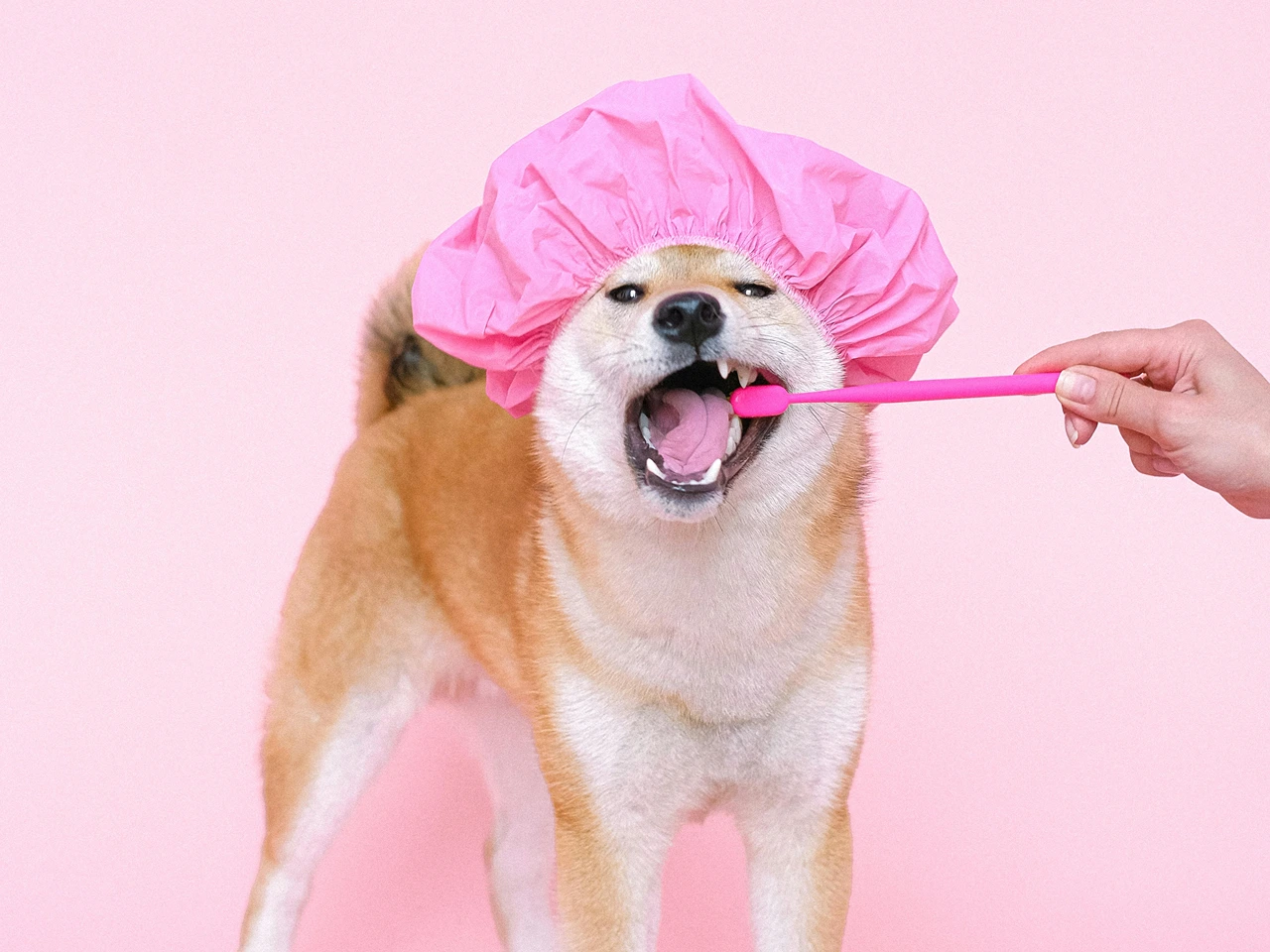
No one loves doggy breath, but not all solutions are equal. Natural remedies like coconut oil or fresh parsley can help mask odours temporarily, but they won’t do much to tackle the root cause. For better, long-lasting results, go with vet-approved options like VOHC-certified dental chews, water additives, or medicated oral rinses prescribed by your vet. These are designed to clean the mouth, reduce bacteria, and freshen breath from the inside out.
When Bad Breath Is a Sign of Something Serious
If your dog’s breath still smells bad even after regular brushing and home care, it might be more than just a hygiene issue. Persistent odour could be a warning sign of:
- Advanced periodontal disease: Often accompanied by inflamed gums, tooth loss, or visible pain.
- Kidney disease: A strong, ammonia-like smell can be a red flag.
- Liver problems: Especially if the bad breath is paired with vomiting, lack of appetite, or yellowing eyes.
When in doubt, don’t ignore it. Always check with your veterinary to rule out anything more serious. Catching the cause early can save your dog from discomfort and lead to a quicker solution.
When to Seek Veterinary Dental Care
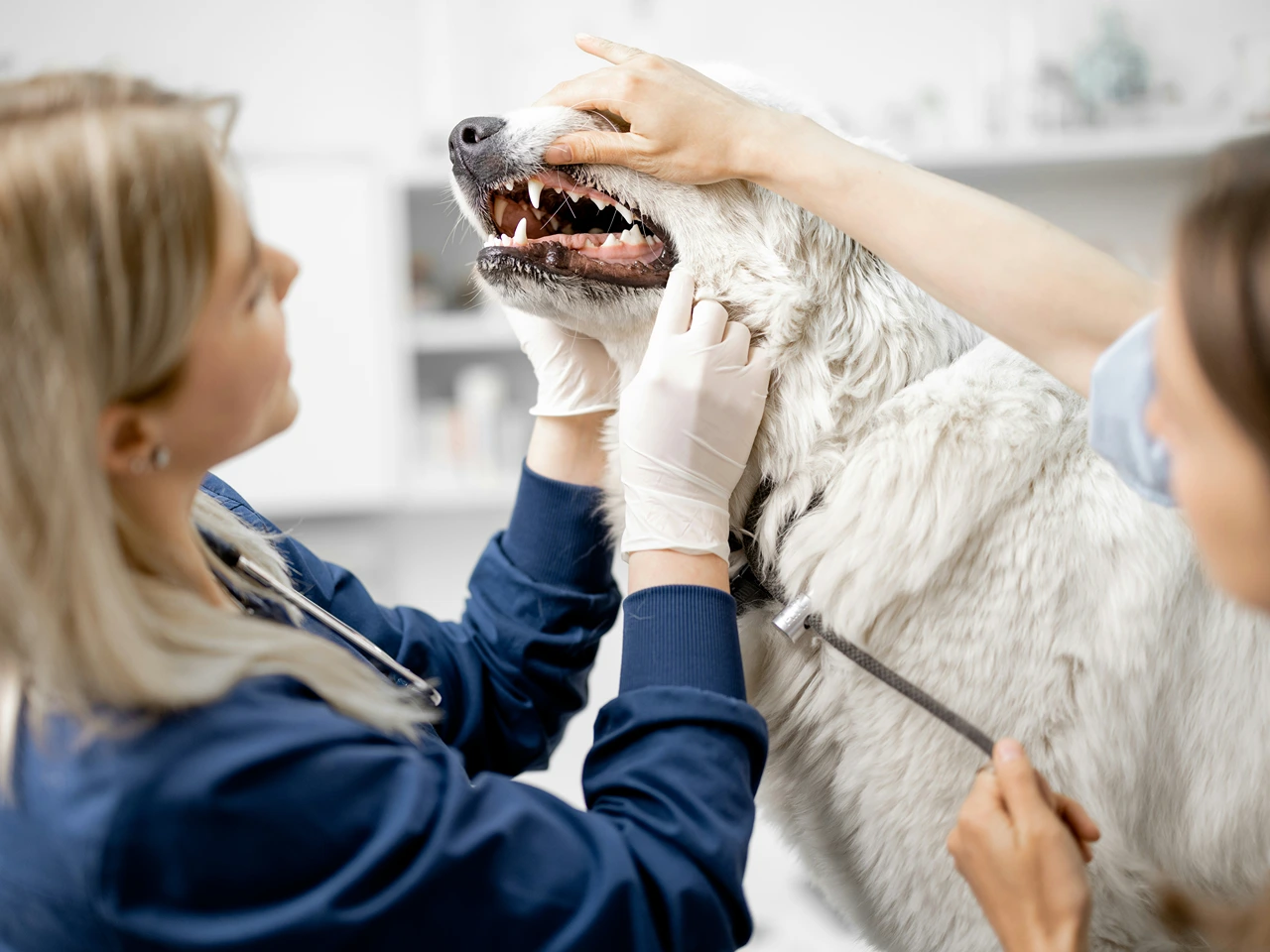
There comes a time when it’s best to clean your dog’s teeth at the vet clinic. Professional care can catch and treat problems that home routines can’t fix.
- Persistent bad breath that doesn’t improve: If brushing and dental chews don’t freshen things up, there could be an underlying infection.
- Bleeding, swollen, or receding gums: These are signs of gum disease that may be causing your dog pain or discomfort.
- Visible tartar buildup or discoloration: Yellow or brown staining means it’s time for a deeper clean before it turns into something worse.
- Loose, missing, or broken teeth: Damaged teeth aren’t just cosmetic, they can be painful and lead to further oral health problems.
- Routine wellness check-up recommendations: Your vet may suggest a professional cleaning based on your dog’s age, breed, or dental history, even if no major signs are present.
These symptoms can be early warnings of serious dental disease or hidden pain. Getting a professional to clean your dog’s teeth not only prevents more costly treatments later, it also keeps your pup feeling their best.
Final Thoughts
The best way to keep your dog’s teeth and gums clean and healthy is with a consistent approach. That’s daily brushing, vet-approved dental products, dental treats and chews and regular cleanings with your vet. Each one helps prevent plaque, gum disease and more serious health issues that can come from poor oral hygiene.
Remember, your dog can’t tell you when their mouth hurts, so being proactive is the kindest thing you can do. Regular care today means less problems tomorrow. Start your pet’s dental care routine strong and schedule a professional dental checkup with us today.
Frequently Asked Questions
Why is professional dog dental care essential for long-term health?
Professional veterinary dental care helps prevent disease, protect internal organs, and keep your pet’s mouth in optimal condition.
Deep Cleaning Beyond Brushing: A vet can clean beneath the gumline, something at-home methods can't achieve, making it important for protecting your dog’s dental health.
Early Detection of Serious Issues: Annual exams help catch dental disease in dogs and cats early, preventing costly health complications.
Tailored Treatment for Individual Needs: Veterinarians consider breed, age, and lifestyle when recommending how often to get your dog’s mouth clean through professional care.
Preventing Organ Damage: Infections caused by poor oral hygiene can spread to organs, highlighting the importance of annual dental checkups.
Veterinary Expertise Matters: A vet’s trained eye and diagnostic tools play a huge role in pet care, making professional involvement non-negotiable.
How can I effectively brush my dog’s teeth at home?
Brushing your dog’s teeth regularly is the most important habit you can build to support their oral health.
Start Slow and Be Consistent: Daily brushing builds up your pup’s dental health and helps them get used to the routine.
Pick the Right Tools: Use soft-bristled brushes and toothpaste made for dogs and cats, never human toothpaste.
Follow a Gentle Technique: Lift the lips gently and use circular motions to ensure every tooth gets its teeth brushed properly.
Use Brushing as Bonding Time: Turn dental care into a positive experience that supports your dog’s dental health.
Watch for Warning Signs: If you notice bleeding, pain, or extreme resistance, it’s time to consult your vet for pet care support.
What are the best dental products to use for home care?
Choosing the right dental products makes home care easier, more effective, and more enjoyable for your pet.
Choose VOHC-Approved Options: These use of products ensures they meet standards for reducing plaque buildup and tartar.
Match Products to Your Dog’s Needs: Some dogs prefer dental chews while others respond better to gels or wipes, each product helps keep your dog’s mouth clean.
Avoid Harmful Ingredients: Stick with pet-safe ingredients in products for dog dental care to avoid toxic reactions.
Supplement with Water Additives: These help freshen breath and control bacteria, especially helpful for multi-pet households with cats and dogs.
Rotate for Better Results: Using a combination of products like chews, wipes, and sprays offers a more complete oral pet care regimen.
When should I schedule a veterinary dental cleaning for my pet?
Regular cleanings are essential for prevention, and certain signs indicate it’s time to book a dental visit.
Every 12 Months or as Advised: Most pets benefit from an annual dental cleaning, but some may need it more often.
If Bad Breath Persists: Chronic odour may be a sign your dog’s dental health is compromised and needs professional care.
Visible Tartar or Red Gums: Signs like discoloured teeth or inflammation mean it’s time to check in with your vet for proper dog dental evaluation.
Behavioural Changes: If your pet avoids eating or cries while chewing, it may be time to clean your dog’s mouth clean professionally.
Breed-Specific Risks: Small breeds and seniors are especially prone to dental issues, making pet care and regular checkups vital.
Are there any dietary options that support dental health in pets?
Yes, specialized diets and dental treats can help reduce plaque, support oral health, and freshen breath.
Dental Diets That Work: Kibbles designed for cats and dogs often have unique shapes and ingredients that reduce plaque as pets chew.
VOHC-Certified Treats: Using approved dental chews supports dog dental care while providing a tasty reward.
Portion Control is Key: Limiting treats to one per day helps improve your pup’s dental health without overfeeding.
Natural Chews vs Commercial Products: Rawhides and bones may clean mechanically but lack the scientific backing of proven use of products.
Always Pair with Brushing: Dental diets support but never replace brushing, consistent routines ensure long-term dog’s dental health success.




